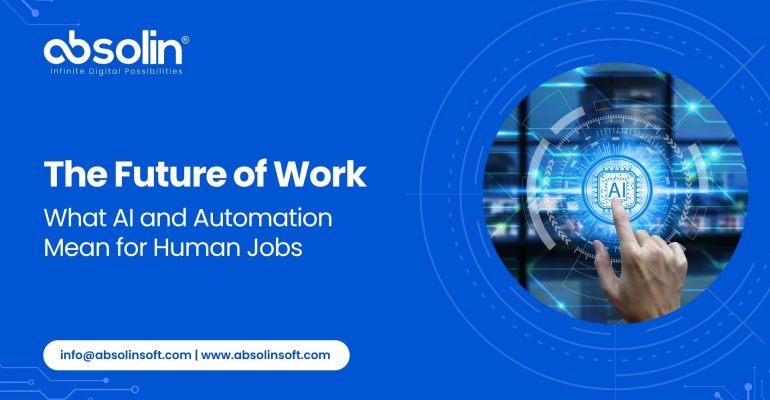The Future of Work: What AI and Automation Mean for Human Jobs
Picture this: it’s 2030. A new job posting shows up on your feed not for a software developer, not for a marketer, not even for a data analyst. The title? “Human-AI Collaboration Specialist.” Responsibilities include “training AI companions,” “overseeing algorithmic ethics,” and “nurturing creative intuition in automated environments.”
Sound futuristic? Maybe. But if the last decade has taught us anything, it’s that the future has a habit of arriving earlier than expected.
We’re standing at the intersection of intelligent automation and human ambition, a place where code can now write code, machines can learn from behaviour, and decision-making is increasingly augmented by algorithms.
So, what does this mean for jobs? Will machines replace us or redefine us?
Let’s dive deep into how AI and automation are transforming the nature of work, what industries and roles are at risk or evolving, and how we can adapt to not just survive, but thrive.
1. The Evolution of Work: From Steam Engines to Smart Machines
Work has never been static. From the Industrial Revolution to the digital boom, new technologies have always restructured job markets. What makes AI and automation different is their scale, speed, and scope.
- Industrial Revolution: Replaced muscle
- Information Age: Automated calculations and processes
- AI Age: Challenging cognitive and creative roles
Unlike past revolutions, AI doesn’t just change what we do—it reshapes how we think, interact, and create.
2. What Jobs Are at Risk—And Why
Let’s address the elephant in the server room: yes, some jobs will disappear. But others will evolve and many will emerge that don’t yet exist.
High-Risk Roles (Routine & Repetitive)
- Data entry clerks
- Telemarketers
- Cashiers
- Basic customer support
- Assembly line workers
These roles are highly automatable due to repetitive, rules-based tasks.
Medium-Risk Roles (With Partial Automation)
- Accountants
- Legal assistants
- Radiologists
- HR recruiters
- Financial analysts
These jobs involve complex but pattern-based decision-making, making them susceptible to AI-assisted productivity rather than full replacement.
Low-Risk Roles (Creative, Human-Centric, Strategic)
- Teachers
- Nurses
- Mental health professionals
- Creative directors
- Entrepreneurs
These jobs require empathy, intuition, and creativity—skills that remain uniquely human (for now).
3. Jobs of the Future: Roles That Will Thrive in the AI Era
Rather than replacing all jobs, AI will reshape job functions and create entirely new categories:
🔧 AI Maintenance & Ethics
- Machine Learning Trainers
- AI Compliance Officers
- Algorithm Auditors
📊 Human-AI Collaboration
- Prompt Engineers
- AI Integration Specialists
- Human-Centered UX Designers
🎨 Creativity and Strategy
- Digital Storytellers
- Innovation Facilitators
- Brand Experience Architects
These roles demand a blend of technical understanding and human insight—the sweet spot of future-proofing your career.
4. How Automation Is Reshaping Workplaces
A. Hybrid Workflows
Instead of replacing humans, AI tools increasingly augment decision-making.
Example: A doctor uses AI to scan thousands of radiology images, narrowing results and enabling faster diagnosis while retaining the final call.
B. Increased Productivity
Repetitive tasks are delegated to bots, allowing human workers to focus on strategy, empathy, and innovation.
Example: Chatbots handle 70% of customer queries, freeing agents to resolve complex cases that need nuance.
C. Skills Over Degrees
Employers are shifting from credential-based hiring to skill-based assessments, especially in AI-literate environments.
5. How to Prepare: Human Skills in an Automated Age
To stay relevant, professionals must lean into what makes them uniquely human.
Critical Skills to Cultivate:
- Emotional intelligence
- Complex problem solving
- Cognitive flexibility
- Creativity and storytelling
- AI fluency (understanding how to work with machines)
Lifelong Learning as a Lifestyle
AI doesn’t eliminate the need to learn – it accelerates. The most successful professionals of the next decade will be those who re-skill every few years.
6. Industry Spotlight: What’s Changing and Where
| Industry | Impact of AI & Automation | Job Outlook |
| Healthcare | AI diagnostics, robotic surgery, chatbots | Evolving roles for caregivers |
| Finance | Fraud detection, robo-advisors, smart contracts | Strategic advisory roles rising |
| Manufacturing | Smart factories, predictive maintenance | Need for engineers and system techs |
| Education | Personalized learning via AI tutors | Greater demand for hybrid educators |
| Retail & E-commerce | Inventory bots, virtual assistants | UX and CX roles booming |
7. The Human Advantage: Why AI Won’t Replace Everyone
Even the most advanced AI lacks the contextual understanding, moral compass, and emotional resonance that define human decision-making. In the end:
- AI can process data, but humans give it meaning
- AI can mimic tone, but humans create connection
- AI can optimize, but humans innovate
The future isn’t about choosing between humans or machines, it’s about designing a future where both collaborate to unlock new possibilities.
Conclusion: The End of Work or the Beginning of Better Work?
AI and automation are not job killers. They are job shapers.
They will eliminate the mundane, amplify the meaningful, and push us to redefine our roles with more imagination, empathy, and purpose. Rather than fear the future of work, we should design it deliberately, where technology handles the grunt work, and humans bring the soul.
So maybe the question isn’t “Will AI take my job?”
Maybe it’s “What incredible things could I do once it frees me from the ordinary?”
Ready to prepare your team or organization for the future of work? Let’s collaborate on a roadmap that balances intelligent automation with empowered humans.



